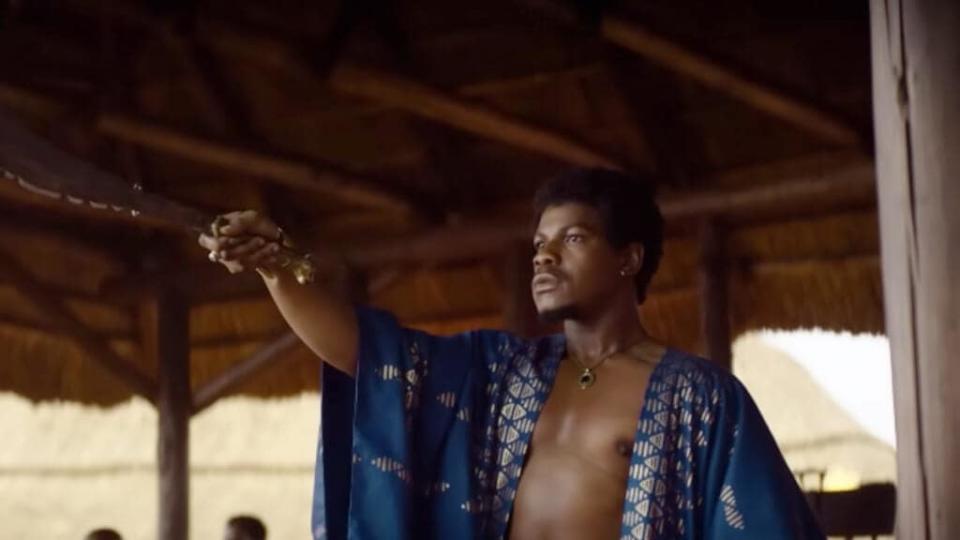Is ‘The Woman King’ Based on a True Story?
- Oops!Something went wrong.Please try again later.
- Oops!Something went wrong.Please try again later.
Sony Pictures’ “The Woman King,” starring Viola Davis, is now playing in theaters, and much like past historical actioners like “Braveheart” or “Gladiator,” those who venture out to see the film will likely be wondering how much of it is rooted in fact.
John Boyega, Lashana Lynch, Thuso Mbedu, Sheila Atim, Hero Fiennes Tiffin, Adrienne Warren and others star alongside Davis in the story of West African women warriors who take no husbands and serve in their positions for a lifetime to protect their nation.
Davis’ character is based on a real life historic figure named General Nanisca, and in the film she trains new recruits alongside Izogie (Lynch) and Amenza (Atim). Headstrong new recruit Nawi (Mbedu) and her peers Fumbe (Masali Baduza) and Ode (Adrienne Warren) challenge their elder superiors with new battle tactics, thoughts and principles.
So is “The Woman King” a true story? The short answer is yes, the film derives from real historical events and accounts, but only so much reliable source material was available. Here’s the real history behind the film.
Also Read:
‘The Woman King’ Film Review: Viola Davis Rules in Fresh and Meaningful Action Film
There Was a Soldier Named Nanisca, and Another Named Nawi
The character that Davis plays, General Nanisca, is largely fictional but may be rooted in fact. According to Smithsonian Magazine, a French naval officer did write an account of a teenage recruit to the woman army named Nanisca. In the French officer’s account, Nanisca “walked jauntily up to [a prisoner bound in a basket], swung her sword three times with both hands, then calmly cut the last flesh that attached the head to the trunk.” The man observing her also wrote that “she then squeezed the blood off her weapon and swallowed it.”
The Nanisca in this historical account supposedly died in battle three months later. Smithsonian also recounts a story of a woman named Nawi.
King Ghezo Ruled from 1818 to 1858

John Boyega’s character King Ghezo (sometimes spelled Gezo) is also based on a historical figure. According to BBC Travel, Ghezo was responsible for incorporating the group named after the Greek mythological Amazons into his army during his reign of the Kingdom of Dahomey, the capital of which was Abomey. Dahomey was a West African empire that lasted from 1625 to 1894.
The empire land can be found in today’s Benin on the coast between Nigeria and Togo on the African continent. BBC Travel also says Abomey, the former capital of the Kingdom of Dahomey and now a thriving city in southern Benin.
Also Read:
Viola Davis on the Long Journey of ‘The Woman King': ‘To Finally Get It Made…Was Close to a Miracle’
The Agojie Can Be Traced to the Dahomey Amazons, and Teams of Female Hunters Known as Gbeto
Time Magazine suggests a theory that roots the Dahomey soldiers to regiments existing in 17th century regiments of female soldiers called gbeto. These teams have also been said to be recruited from among the King’s many wives. Time highlights Sylvia Serbin’s “The Women Soldiers of Dahomey,” which says that categorization of the warriors and their names were based on a woman’s weapons expertise and her assigned unit. The King was always surrounded by armed women in public and private life and by the end of the 19th century, around 4000 women, who began training as teenagers, were among the Dahomey military ranks. Another source Time used includes Henrik Clarke’s essay on African Warrior Queens: “Black Women of Antiquity.”
The Dahomey Amazons Also Inspired the Dora Milaje in Marvel’s “Black Panther”
The highly skilled all-female warriors in Marvel’s “Black Panther” (and previously in the comics) known as the Dora Milaje drew inspiration from the same group of Dahomey Amazons, named so by the French in comparison to the mythological women warriors. Time cites the first introduction of the Dora Milaje to the “Black Panther” comic by Christopher Priest, who took over as the series’ lead writer in 1998. In the fictional world of Wakanda, the Dora Milaje serve as the king’s female bodyguards, and they are led by Okoye (Danai Gurira), who will reprise her role in the upcoming sequel “Black Panther: Wakanda Forever.”
Also Read:
Viola Davis Joins ‘Hunger Games’ Prequel as Volumnia Gaul

